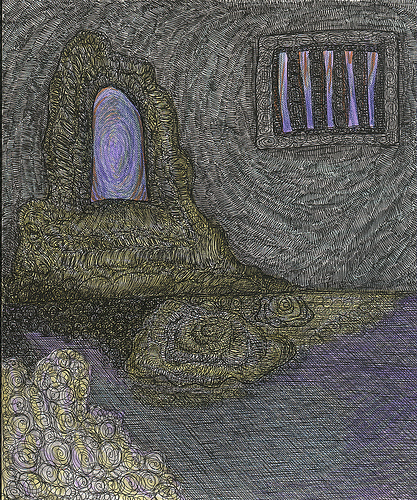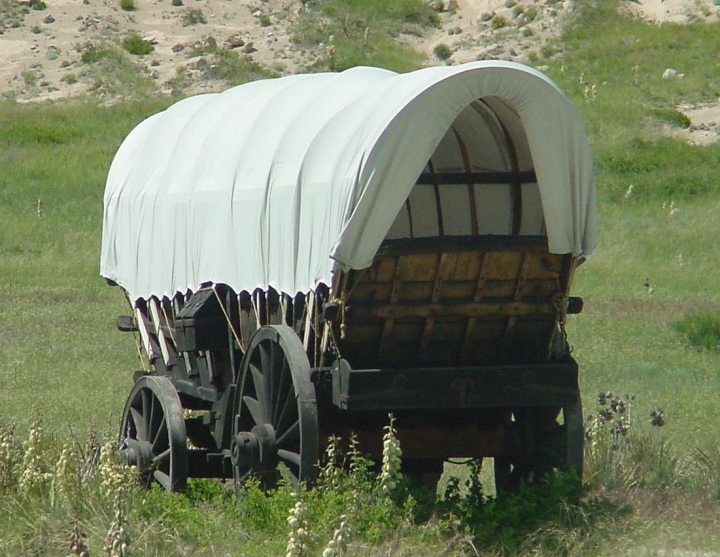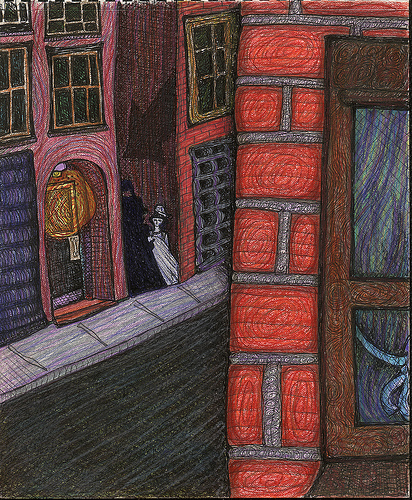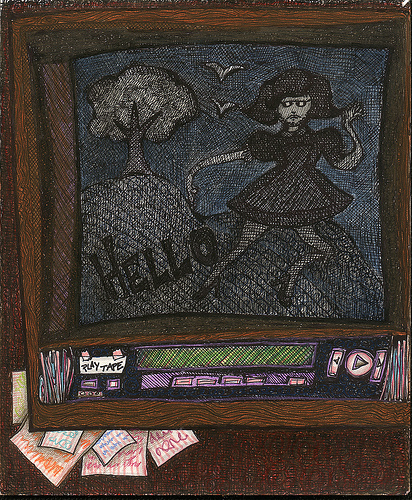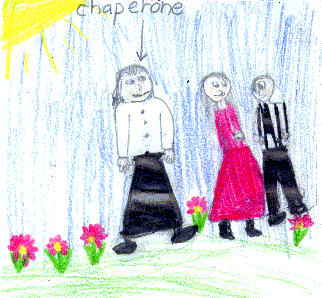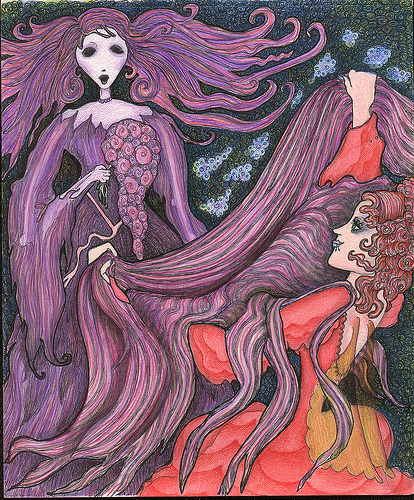Wizard Constable, Chapter 20 - "A Journey Begins"
Chapter 20 - A Journey Begins
When they pulled their wagon out of town the next morning, they found the area outside the city gate a teeming mob of wagons, horses, and people. Dust was everywhere, and there were officers galloping around on horses, yelling at people, trying to organize the mob into a marching column. Jorac presented his orders to four different people before finding someone to tell him that his place was at the back of the column, and (sneeringly) to keep out of the way of real army men.
Eventually, they found the area that should become the back of the column. They parked the wagon, and Jorac asked Hox to spend some time rearranging the supplies. They’d packed in a hurry, and would want room to sleep inside the wagon in a few days. Outside of the weather-controlled area, it was spring, and they were heading toward the even cooler Northlands.
Meanwhile, Jorac walked around and checked out the nearby wagons. A few sported a large tag with an “O” that he learned meant “observer”; he was told he’d be issued one soon. The other wagons weren’t actually part of the army but were planning on following it. Jorac wandered among them, watching to people renew acquaintances from the year before and do last-minute loading. He saw some suspicious types who looked at him appraisingly, while others seemed to be friendly, salt-of-the-earth merchant types.
At one wagon, he met a fat, cheerful older woman who sold cooking oil and spices and had a greeting for everyone who walked by. She wasn’t doing much business, but it didn’t seem to worry her. Jorac’s rubbernecking attracted her attention.
“First time out, dearie?”
Jorac nodded. “I’m a new observer. Still trying to figure out how this whole thing works.”
“Well, come sit down and talk to me. You’re a nice-looking young man, and I don’t mind telling you what I know.” She smiled and patted the folding chair next to hers, so Jorac sat down gingerly.
“Relax,” she said, “we won’t start moving until this afternoon sometime, anyway. I’ll have no business today, but I’ll sell out in a week, and head on back.” She pointed around at the wagons in the area. “Lots of these folks will follow the army right north, all the way to the northern border, but not me. I don’t mind a week or two out of town, but not three weeks there, a bit less coming back empty.”
“The northern border? I thought that was way up at the cold, treeless country that no one much wants.”
The woman laughed a little. “Oh, you are new at this. Well, if you don’t mind listening to an old lady natter on, I’ll explain it. The army lets us follow until we get to the old northern border, not the current one. No one in Old Etrombia is fighting us, so it’s nice and safe. But once they get close to the town of Norfort they send the followers packing, and just the army folk go on from there.”
“And you say that takes three weeks? I could ride there in a week, or less if I pushed it.”
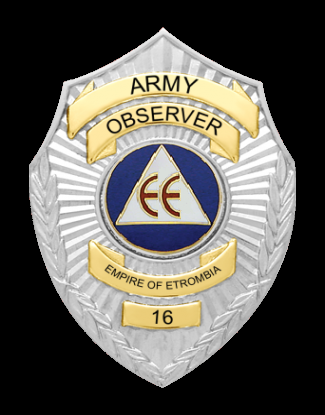
“The army never moves very fast, at least down south. You’ll see. Sometimes it’s the weather, or a bad section of road or something, but it’s always something. I turn back when they bunch up to cross the Japrees river; that’s about a week from now. Most of the other folks go further along; they just follow the Broxna river road, all the way to Norfort. The army supplies go by river barges, of course; it takes a lot to feed an army this size, but they get it done.”
“What sort of folks are here? I mean, what do they do, and why are they following the army?”
She started counting them off on her fingers. “Well, there’s the wives, of course. Some soldiers are married, but not so many. There’s rules against prostitutes, so there’s lots of ‘extra workers’ – cooks who can’t cook, laundry ladies who don’t wash, and so on. Real laundries for those without real wives. Armor sellers, sword makers, all sorts of soldierly crafts – the army has its own of course, but some soldiers will pay for something a bit fancier. Some folks sell talismans, good luck charms, and the like – they won’t sell much until the last day or two. A couple of wagons sell liquor, but they keep it quiet and package it like lotions and potions and such, because selling liquor to the regular soldiers is against the rules too.
“And a few like me, selling the things folks should have bought in town. Each day out I increase my prices a little, but it still sells. Oil is heavy and I can’t carry much, but I do alright with it. Up north they use mostly sheep-lard, and most city folks don’t like the flavor it gives, so they’re glad to pay me. And it makes for a nice little break from the shop each year.”
Jorac thought a moment. “You know, I’m not sure I brought enough oil either. I guess I should buy some while it’s still cheap.” He knew the sheep-lard flavor well, and didn’t miss it.
In good humor, she smiled. “Ha! The old sales trick worked. Tell you what, there’s a couple of cases I haven’t packed away yet. That one there – see if the lid is loose on it.”
It proved to be, and soon Jorac had exchanged two silvers for a large jug of cooking oil. She grinned and said, “I’ll be getting triple that in a week, and folks will be glad to pay me too.”
He thanked her and carried his purchase back to Hox, who said he was almost done arranging the wagon.
“Here you go, some extra cooking oil. How’s the wagon space looking?”
“I think it’ll work out fine. I can sleep across here, kind of diagonally, and I think you’ll fit across the back. I may want to get some more blankets or something to level it out.”
“Well, grab a handful of coppers and ask around the wagons back that way. They aren’t the army, they’re the army followers. Some of them remind me of the folks in Swampside, so watch yourself.”
Jorac busied himself making a place for the jug of oil, and watched the column gradually getting assembled. When Hox came back, he had some blankets under his arm and word of a recent acquaintance. “Madame Revar was asking for you.”
Jorac raised his eyebrows in surprise. “Did she say what for?” He didn’t think he had any business with the biggest lady pimp of Swampside. He hoped not, anyway.
“No, she just asked if you were around. She was trying to teach some of her girls how to do laundry. They were bending way over into the wash basin, and bouncing up and down. I thought any woman that age would already be taught to do laundry by their ma, but I guess not.” Hox’s eyes twinkled with knowing good humor. He played the country bumpkin well enough, but his understanding of city ways had grown tremendously in the few months he’d been a constable.


